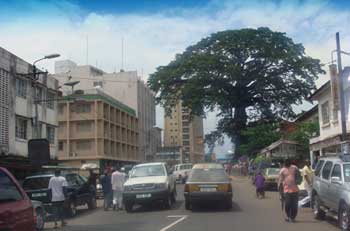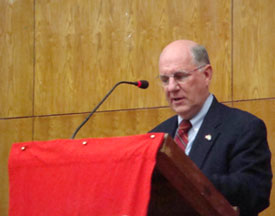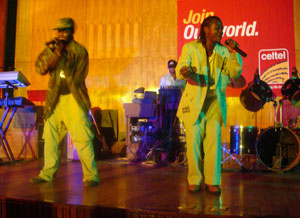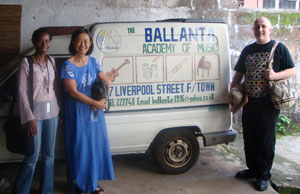OnlineRock Founder Steven Beck Visits Sierra Leone
By Steven Beck Copyright 2007
About three months ago I was asked to
travel to Sierra Leone to speak and participate in a
conference entitled “Moving
the Music Industry Forward”. The trip was
sponsored by the US State Department and was the second
time I’ve
been asked to do something like this. The first
time was to Montenegro. I’d
never been to Sierra Leone before let alone Africa. I
did a lot of research before agreeing to make the trip.
Sierra Leone is located on the coast
of western Africa with the capital being Freetown. The
country was embroiled in an eleven-year brutal civil
war which saw over 50,000 deaths and countless more maimed. In
2002 the war was declared over and elections took place
with nearly an 80% turnout of those eligible to vote. The
next election was scheduled to take place on August 11th,
2007. The votes are still being counted as I write this
and it looks as though there will be a run-off for president. Although
making progress, Sierra Leone is considered one of the
poorest countries in the world with nearly 70% of its
citizens living in poverty.

Downtown Freetown and the Cotton Tree
Needless to say I was nervous but also
curious about this opportunity. I had to get a
number of vaccines before going along with a prescription
for anti-malaria medication. Travel
time from San Francisco would be about 24 hours with
layovers but, since the airport in Sierra Leone is located
across the bay from Freetown and transportation is questionable,
it took me over 30 hours until I arrived at the Hotel
Cabenda. It was a comfortable place with a
restaurant and internet access.
- Day One -
After a few hours of sleep, a driver
picked me up at my hotel and took me to the US Embassy
where I met Amy Challe. She works for the State
Department and was my primary contact in Sierra Leone. I
met her briefly the night before as she welcomed me to
Freetown. Amy
showed me around and introduced me to Amelia Brown who
is the acting director at the embassy. The three
of us then headed to the Miatta Conference Centre in
the center of Freetown. Approximately
180 people
were scheduled to attend.
The program started with a number of
opening statements from the people responsible for making
the event possible and those involved in the industry. Dr.
Julius Spencer, Managing Director of Premier
Media and
the chairman of the conference, stressed the importance
of a thriving music industry in Sierra Leone. Thomas
Hull, the US Ambassador offered support from the US Embassy
and noted that a successful industry could help create
jobs. He also gave me a very kind introduction.

US Ambassador Thomas Hull
After the opening statements and a short
snack break, we started our first session “Key
Elements for a Successful Music Industry” in which
I gave a presentation describing the basic structure
of the US music industry. I started off by saying
that in my search for information on Sierra Leone music,
it was difficult to find much information. I tried
to show that it wasn’t just artists that made up
the industry but also labels, clubs, media, equipment
stores, Web sites and CD manufacturers as well as so
many others. I
was able to show the pressures of piracy on the industry
and noted that its influence is felt by all of those
involved, from artists and labels to retail outlets and
even consumers. Finally, after giving a few tips
on what has helped me over the years, I let people know
that music, to me, is an art form that is important to
our culture and not just a commodity that can be bought
and sold.
Mark Ainley, my UK counterpart and founder
of Honest
Jon’s Records gave a brief
outline of how the industry works in the UK. As
the head of a label and an owner of a record store, he
described the decline in sales and how piracy has a direct
impact on his business. Dr. Kitty Fadlu-Deen from
the Balanta Academy, who chaired this session, reviewed
what Mark and I spoke about and then opened it up for
discussion. We had many questions regarding the
structure and responsibilities of labels and their relationship
with musicians.
The afternoon panel was entitled “Breaking
into the International Music Scene” and was chaired
by Emrys Savage (King Fisher), manager of Bodyguard Studio
and included Jimmy Bangura (Jimmy B) and Lansana Sheriff
(Steady Bongo) as well as Mark and myself. We
discussed the need for musicians to incorporate distinct
and traditional local sounds with western styles that
have become popular. We also discussed the need
for musicians to increase the quality of their products
by working with high-end studios and producers, seek
professional training if needed, and assemble a top-notch
live band instead of just using backing tracks.

Marketing and Distributing Panel
The final panel of the day discussed “Marketing
and Distributing Sierra Leone Music” and included
local production houses, distributors and labels. I
was not involved with this panel and although it was
a bit difficult to get a grasp of the situation, it seems
that many had concerns that the current distributor is
playing a dual role by providing products wholesale as
well as retailing them in its shop. This can create
restrictions for expanding the market.
That was it for the first day. In
my preparation for this trip I read so many warnings
about what to eat and what not to eat while I was in
Sierra Leone but never had a problem. Later
that evening, after sampling some Star Beer, a local
brew, Amy, Amelia, Mark and I all went out to the Lighthouse
Restaurant for dinner. I had grilled barracuda
which was so good that I had it at my hotel restaurant
the next night as well.
- Day Two -
Mark and I opened up the second day
of the conference by recapping the events of the first
day. Chukuemeka
Taylor, a local attorney then did an excellent presentation
on copyright protection in Sierra Leone. He defined
many parts of the 1965 law but noted that it was very
difficult to understand. He also stressed that
there is little to no law enforcement in place to combat
issues of infringement. His presentation even helped
me understand how US laws work a bit more clearly.

Steve Beck discussing label structures
For most of the remainder of the day, participants in
the conference split up into three groups to discuss
and make recommendations regarding the following subjects:
– Strengthening copyright legislation
and enforcement mechanisms
– Producing and managing musicians
– Marketing and distributing Sierra Leone
music worldwide
Mark and I served as consultants to the groups as they
discussed these issues and came up with recommendations
on the various topics. At the end of the day each
group presented their initial suggestions on how to deal
with these issues.

Members of the Links group performing live
Later that night, after dinner, many
of the participating musicians put on a live concert.
Steady Bongo and the Cultural Heroes provided a live
band and sound for most of the acts to perform with. Others
used backing tracks or played their own instruments. This
was an important step as many artists in Sierra Leone
actually mime their music and don’t sing or play
live. Musicians
such as Daddy Rhymes and the Gospel Group were crowd
favorites but mine was the Links group that includes
Mackie, Sapano, Succulent and Lady Amit. They have
a new song dubbed “The Rubber Song” that
everyone was talking about. With the issues of
AIDS in Africa, this song could be very popular throughout
the region.
- Day Three -
On the third and final day of the program
and my last in Sierra Leone we arrived at the conference
center. The day started by critiquing the previous evening’s
concert. Mark and I were not needed during this
period so we accepted an invitation from Dr. Kitty Fadlu-Deen
to take a quick tour of the Balanta Academy of Music
in downtown.
In addition to getting to see a bit
more of Freetown, visiting the academy was a nice break
from being in the conference center. The Balanta Academy
is non-profit and is governed by a Board of Directors
with a goal to teach music to a high professional standard.
They also receive a modest subsidy from the Government.
In 2006, they had an average of 50 students per term.
The curriculum includes the required “Theory of
Music” along
with classes focusing on individual instrument such as
piano, drums and guitar.

Amy Challe, Dr. Kitty Fadlu-Deen and Mark Ainley
I was extremely impressed by the Academy,
not only by their organization but also by what they
give back to their community and culture. One of
the issues brought out by the conference was the lack
of proper education of musicians, and here was a place
that in addition to offering training to those starting
out, they also offered classes for musicians who are
already involved in the industry. It came to my
attention that the Academy needed a keyboard/workstation
and, through OnlineRock, I was able to donate an Alesis
Fusion 6HD to them. These
are not available in Sierra Leone and will be put to
good use.
We headed back to the conference center
where the three groups were now refining their recommendations
based on the comments from the day before. Mark
and I were once again available for consultation. The
process seemed to work well as most participants were
able to contribute in the discussions and the recommendations
that the groups came up. These would later help to shape
the action items from the conference.
During lunch, Mark, Amy and I took another little side
trip to the Freetown Big Market. The 143 year old
Wallace Johnson Street Market was re-opened in 2004 and
houses a number of vendors selling crafts and batiks. Although
it was a bit overwhelming with people trying to get our
attention, Amy was able to negotiate for me and I was
able to pick up a few items to bring back to my friends
and family. Amy also got me a beautiful shirt as
a remembrance of my trip. Here is a video of the
Big Market:
Lunch was still being served when we
returned. The
conference provided lunch each day and they served some
local dishes. This day we had cassava leaves with
fish over rice and the day before was groundnut stew.
After all of the warnings that I had about the food,
everything was fine and I enjoyed all of the dishes that
I tried while I was there. The stews had a bit of
spice and the fish was always fresh.
The remainder of the conference was
spent on recommendations and action plans to help move
the music industry forward. The
first was to create a task force to ensure that these
recommendations were followed through with. This
16 member group would consist of musicians, producers,
DJ’s, distributors, media and venues. Musicians
were also encouraged to become members of the Sierra
Leone Musicians Union to strengthen and restructure it
to meet the current needs of its members.
Other recommendations included establishing
a Copyright Office within the Ministry of Trade and Industry,
drafting new Intellectual Property legislation that would
address the current times, and create a forgery-proof
seal that would be applied to all legally produced products
to help combat piracy. It was also recommended
that the Miatta Conference Centre should be converted
into a National Arts Centre that could be used for both
conferences and performing arts. My recommendation for
creating a central Website for Sierra Leone’s Music
was taken into account as well.
Dr. Spencer then brought the conference
to a close. There
was a feeling of accomplishment but also the understanding
that there was a long way to go. There was hope
that with the support of the conference’s sponsors,
this could be turned into an annual event. A number
of participants wanted to chat with me, and a few members
of the media asked for interviews. Throughout the
three days I got to talk with many and feel extremely
fortunate to meet the people that I did.

Interview for UN Radio
I am very grateful for the opportunity
to travel to Sierra Leone. It is with much respect
that I thank Amy Challe for all of her guidance and support
while I was in Freetown. Without her I would have
been lost. She made me feel comfortable and was
a perfect liaison as she knew many of the people involved
with the conference. I’d also like to thank
Gretchen Christison who initially contacted me about
this opportunity and arranged all of my travel plans.
Mark and I commented on how involved
and enthusiastic the conference participants were and
we noted that it would be rare to see that level of devotion
at a similar event in the US or UK. I now have
a better understanding of the hardships many have to
face and the challenges they had to overcome, not to
mention that electricity and water are still not accessible
or reliable to all. I
would like to commend those involved in the music industry
for realizing they have issues to deal with and taking
action to correct them. Some who have enjoyed international
success are even putting efforts back into the local
scene by starting their own labels, building studios
and setting up distribution. I look forward to
following the developments in the country, keeping in
touch with my new friends and listening to the latest
music distinctly from Sierra Leone.
Free Music From Sierra Leone:
Some of the musicians and producers
that I met gave me CDs and asked to post their music
on our website. Below are a few free downloads. I expect
a few more so check back soon:
Tribalism
by Tetina Cultural Group from the album "Uman
nor to slave nar man ose" - Meaning
a woman is not a slave in her marriage home. It's
a cultural album preaching about peace in Sierra
Leone, since we're from ten years of war. Produced
by Brima Timbo Sesay (Dj Britel) King Fisher and
Sexy P for Marbrite Production Freetown, Sierra Leone.
Free
We by King Bangs (Tapsiru King) from the album "Free
We" - King Bangs has been involved
in the music industry for over ten years. His previous
releases include Why Cry, Sweet Sweet Salone, Give
Peace a Chance (composed during the war) and Welcome
Peace (after the signing of the peace accord).
By
U Way by Leslie from the album "Running into the
Future" -
It's an R&B album mixed with African
rhythm and vibe. Published and Promoted by Marbrite Production
Freetown, Sierra Leone.
Sedative
by Zibo (David Konteh) from the album "Sedative" -
Zibo is currently working on his new album. This
one was recorded at Island Studios in Freetown, Sierra
Leone and was produced by Sam Jones.
Nut
Nut by BSL (Born Sierra Leoneans) from the album "Nut
Nut" - Meaning Nil Nil. It's a rap
album mixed with Zouck, Ragga and Cultural beats.
Produced by Brima Timbo Sesay (Dj Britel) King Fisher,
Sexy P, Sahr Issa, Dave Corker and Kaiyo for Marbrite
Production Freetown, Sierra Leone.
|